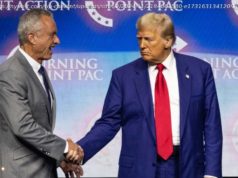The Supreme Court on Wednesday considered a major case concerning the Fourth Amendment, discussing privacy in the digital age and how to apply established legal rules to rapidly changing technology.
Justices of the U. S. Supreme Court / Getty
BY: Katelyn Caralle Follow
@Katelyn_Caralle November 29,2017 5:22 pm
The Supreme Court on Wednesday considered a major case concerning the Fourth Amendment, discussing privacy in the digital age and how to apply established legal rules to rapidly changing technology.
How the nine justices decide the case could provide a framework for the federal government’s surveillance power going forward, and some privacy advocates say the outcome could impact other issues such as digital medical records and Google search data, CNN reported .
The Trump administration’s position is that the government does not need a warrant to seek digital data from cell phones that reveal a user’s location. Several justices struggled with this view and expressed their concerns.
Deputy Solicitor General Michael R. Dreeben argued before the Supreme Court that individuals have diminished privacy rights when it comes to information that they have already voluntarily turned over to a third party, including a phone company.
Several justices pushed back on Dreeben’s arguments for various reasons.
«Most Americans, I still think, want to avoid Big Brother,» Justice Sonia Sotomayor said. «They want to avoid the concept that government will be able to see and locate you anywhere you are at any point in time.»
Sotomayor said that cell phones have become an «appendage» for people today and she noted how mobile devices can be pinged in bedrooms and doctor’s offices.
Other justices worried about how they should draw the line in cases concerning the sensitivity of data and what type of digital information should trigger Fourth Amendment protections.
The Fourth Amendment protects «the right of the people to be secure in their persons, houses, papers and effects, against unreasonable searches and seizures.»
Most courts have ruled that, since the information from cell-site location data has already been provided to phone companies or other third parties, there is a diminished privacy interest.
«This case is the first chance to start to set reasonable limits applicable to requests for these kinds of digital-age records by making clear that a warrant will sometimes be required,» American Civil Liberties Union lawyer Nathan Freed Wessler said in opposition to the government’s stance.
The controversy over the case arose after a string of nine armed robberies at Radio Shack and T-Mobile stores in Michigan and Ohio. One of the robbers, who confessed, provided the FBI with his cell phone number and the numbers of the others who participated in the scheme.
Under the Stored Communications Act, which authorizes the government to obtain cell service providers’ records under some circumstances, the FBI was able to retrieve cell-site data for a Timothy Carpenter that placed him in the vicinity of the robberies over a range of 127 days.
Based in part on the location data, Carpenter was convicted of aiding and abetting the crimes.
Lawyers for Carpenter argued that the «reasonable grounds» standard necessary to reveal the cell-site evidence was too law of a bar, and instead said the Fourth Amendment requires the government to first obtain a search warrant pursuant to the higher standard of «probable cause.»
A federal appeals court has ruled in favor of the government, and the ACLU appealed the case to the Supreme Court on behalf of Carpenter, warning the justices of the privacy implications at stake.
«Allowing law enforcement to obtain such records free and clear of any Fourth Amendment restrictions would dramatically shrink the amount of privacy that people enjoyed from the time of the Framing through the dawn of the digital age,» Wessler argued.
Nineteen states have filed a brief in support of the government, saying that cell-site data is general in nature. Lawyers for the states acknowledge, however, that other cases concerning «more sensitive data» could be addressed more in depth in the future.
Katelyn Caralle Email Katelyn| Full Bio| RSS Katelyn Caralle is a media analyst at the Washington Free Beacon. Before joining Free Beacon, Katelyn worked as a Digital Strategy Intern at The Heritage Foundation. She graduated from Bloomsburg University of Pennsylvania in 2016 where she served as Editor-in-Chief of The Voice.






